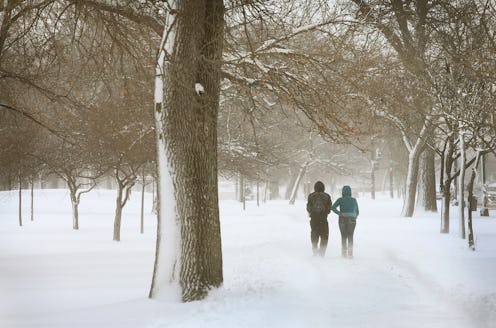News
How To Protect Yourself From Winter's Dangers
Nobody can argue that cold weather can be unpleasant (or, if you're me, intolerable), but sometimes winter can be truly dangerous. There are a myriad of hidden dangers lurking behind each snowfall, each shovel session, and even in fun family winter activities. On Tuesday, a massive snowstorm in Buffalo left six people dead and trapped more than 100 — and it was only the first snowstorm of this winter season. We have at least four months of this nonsense to go, so lest you become a victim of Old Man Winter (that bastard), get to know the season's hidden dangers so you can protect yourself and your family.
Right now, Buffalo has accumulated more than six feet of snow, possibly setting an all-time U.S. record. The current record for snowfall in a 24-hour period is 76 inches, set in 1921, and some parts of Buffalo have already surpassed that amount. More than 130 miles of Interstate 90, a crucial highway that connects east and west New York state, have closed, trapping more than 100 cars on Tuesday night. As of now, there is no word on when the road will reopen.
New York Gov. Andrew Cuomo declared a state of emergency for 10 counties. And the worst part is that the snowfall may be far from over. Weather reports are predicting three to eight more inches outside Buffalo on Wednesday, and up to two more feet by Thursday night.
So far, six people have died as a result of the snowstorm, three of them from heart attacks while shoveling the heavy snow. One man was found dead in his car, and another was killed when he was pinned by a vehicle that had been stuck in the snow. These deaths prove that winter weather is much more than just a nuisance.
Shoveling Risks
It may seem like just another house chore, but shoveling is an extremely strenuous activity. Half the people who died from the recent snowstorm had heart attacks while shoveling snow. Your risk of heart attack is already increased by 53 percent in the winter because our arteries constrict in cold weather. Even if your heart is strong, shoveling snow can cause back strains and muscle injury.
How to protect yourself: Use a smaller shovel, which may make the job take longer, but you won't be lifting heavy loads of snow. Take frequent breaks and stop immediately if you feel any pain or overheating. And stay hydrated.
Slippery Roads
Ice on the roads is one of the most perilous side effects of winter. Not only can you fall and seriously injure yourself while walking, but driving becomes exponentially more precarious. The phenomenon known as black ice — a thin layer of ice over the pavement that's nearly impossible to detect — can cause a car to lose control at 10 mph. Icy roads are responsible for hundreds of deaths in the U.S. every winter.
How to protect yourself: Try to avoid driving in wintry conditions altogether. If you must, wait until the roads have been plowed and salted. Make sure your car is prepared and your brakes are in tiptop shape. Decrease your speed while on the road and leave yourself plenty of room to stop in between cars and before stop lights. If you do feel yourself skidding, gently pump your brakes instead of slamming if you have standard brakes; if you have anti-lock brakes, apply gentle pressure on them.
Sledding Injuries
The best part of winter is the fun activities you can do in the snow, like sledding. Who doesn't love sledding? You need to be aware, however, that it can be highly dangerous if you're not careful — or even if you are. Sledders could lose control of their speed and skid into the street, crash into a tree, or go flying off the sled and land wrong.
How to protect yourself: Choose a hill that's not too steep and ends with a long flat area, like a field, that allows you to come to a complete stop safely. Don't choose hills near traffic or that are dotted with obstacles like trees, fences, or ponds. As for the sled, shell out for the more high-tech kind that you can steer and brake, and always wear a helmet.
Hypothermia
One of the most unavoidable and dangerous risks of cold weather is simply being exposed to it. Even if you think you're protected by your thick down parka, freezing wind chills can cause your body to lose heat fast. A low body temperature will affect your heart, other organs, and nervous system. If left untreated, your heart and respiratory system could fail and you could die.
How to protect yourself: Besides wearing the warmest coat you can find and making sure your extremities are as covered as possible, try to avoid staying out in the cold for too long. It's not like you're enjoying it, so go inside as soon as you can. If your clothes happen to get damp from snow or ice, go inside immediately and change into dry clothes. Hypothermia can even occur indoors, so make sure your house is properly heated and insulated for the winter.
Images: Getty Images (4)
